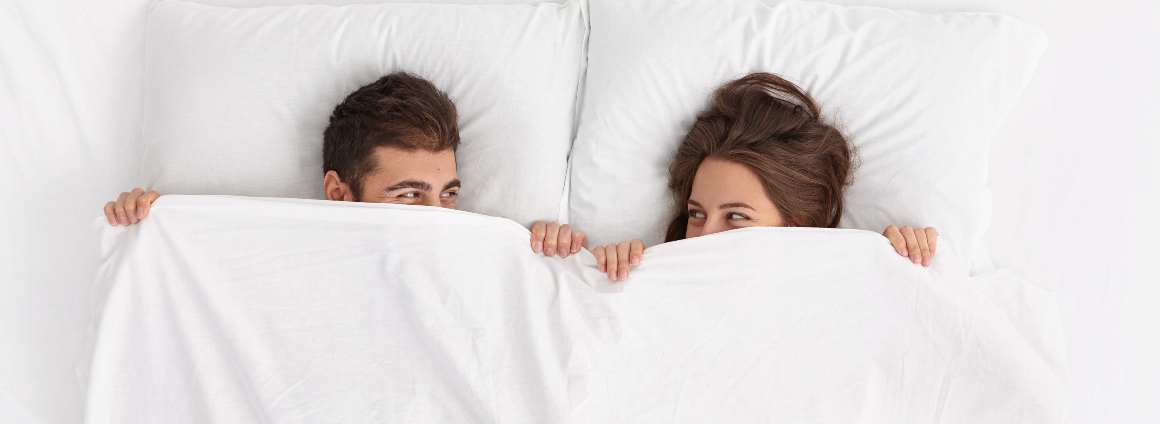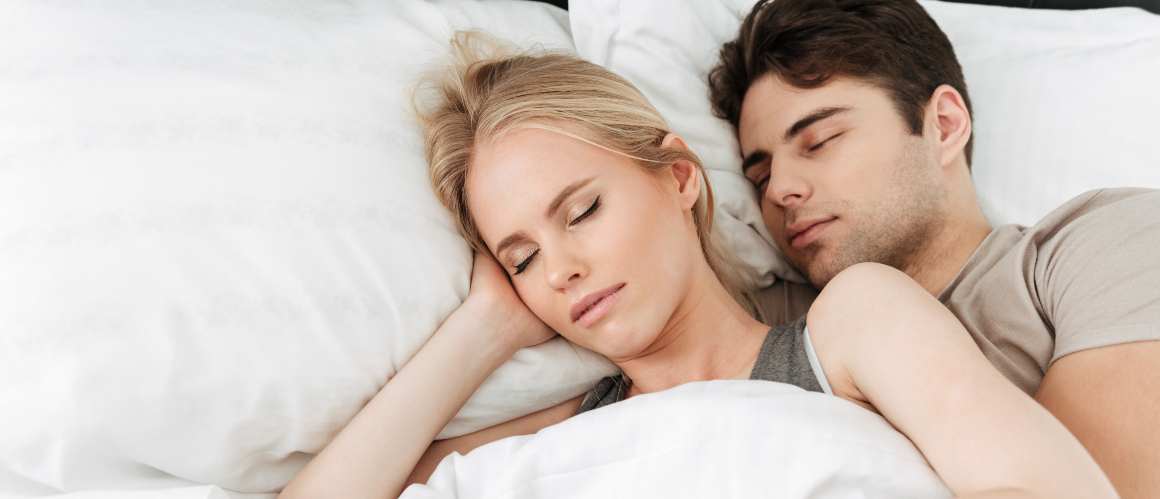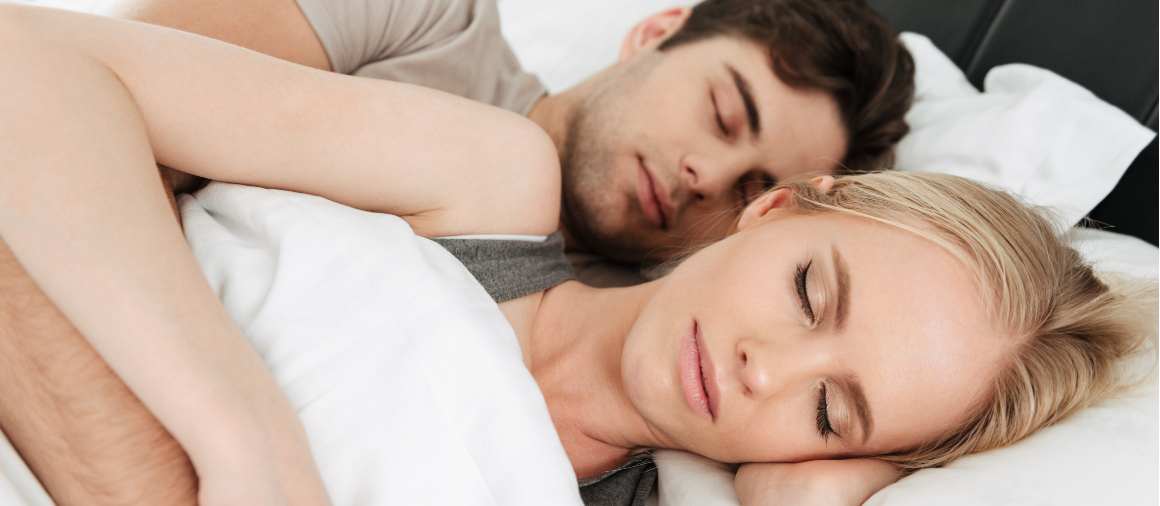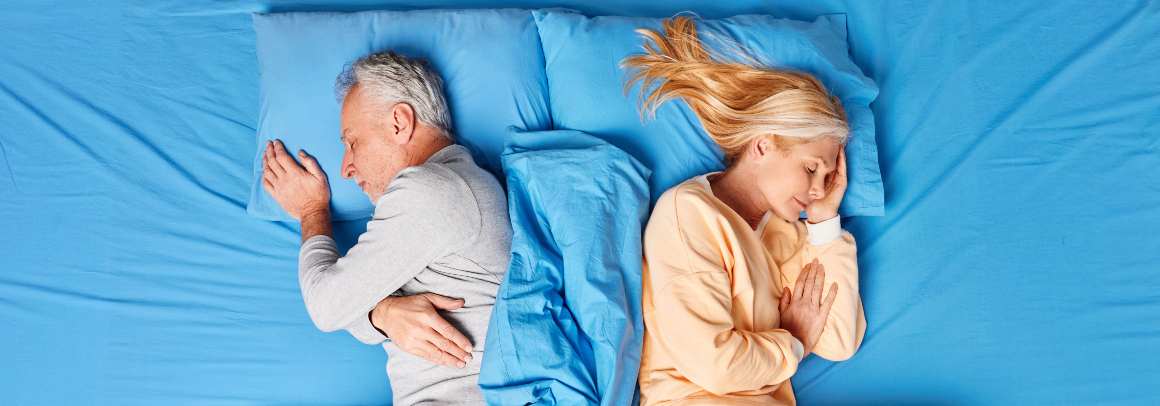Do Women Need More Sleep Than Men?
Published:
Do women need more sleep than men? This long-standing query has intrigued many, and new scientific evidence is now available to provide answers. In this blog post, we will delve deep into the science behind women's sleep needs, exploring factors such as brain function differences between men and women, hormonal influences on sleep requirements, and psychological distress due to unhealthy sleeping habits.
Contents:
- The Science Behind Women Needing More Sleep
- The Science Behind Women Needing More Sleep
- Effects of Poor Sleep Quality on Mental Health
- Hormonal Influences on Women's Sleep Needs
- Psychological Distress Due to Unhealthy Sleeping Habits in Females
- Sleep Requirements for Non-Binary and Transgender Individuals
- Improving Sleep Quality through Lifestyle Changes
- FAQs in Relation to Do Women Need More Sleep Than Men?
- Conclusion
We will also discuss how poor sleep quality affects mental health in both genders differently. Furthermore, we'll shed light on the limited research regarding non-binary and transgender individuals' sleep requirements while considering gender-specific factors that influence individual restorative needs.
Finally, our exploration of "do women need more sleep than men?" would not be complete without providing practical tips for improving your overall sleep quality through lifestyle changes like exercise routines or establishing consistent bed/wake times for improved circadian rhythm regulation. By understanding these complex factors at play in our nightly slumber patterns, we can make informed decisions about optimizing our own unique restorative processes.

The Science Behind Women Needing More Sleep
Multitasking tendencies among women lead to a need for slightly more time to recover during sleep, while additional responsibilities related to work, family caregiving, and social obligations contribute as well.
Brain Function Differences Between Men and Women
Women's brains tend to be more complex than men's due to the extra effort of multitasking, necessitating additional sleep for recovery. This is because women often engage in multitasking activities throughout the day, which requires their brain cells to work harder. As a result, they need extra sleep for recovery purposes. A study conducted by Loughborough University found that on average, women tend to need 20 minutes more sleep per night than men.
Impact of Multitasking on Sleep Requirements
Multitasking has been linked with increased mental fatigue and reduced cognitive performance over time. Since many women juggle multiple roles such as career professionals, mothers, or caregivers, it can take a toll on their overall quality of life if they do not get enough restorative slumber each night.
- Sleep disruptions: The constant switching between tasks can cause fragmented thinking patterns leading towards disrupted nighttime rest cycles - resulting in less efficient deep REM (rapid eye movement) phases essential towards maintaining optimal daytime alertness levels alongside emotional wellbeing stability markers like mood regulation abilities plus memory consolidation processes efficacy rates too.
- Poor sleep efficiency: When our minds are preoccupied with multiple responsibilities, it becomes difficult to fully relax and transition into a state of deep sleep. This can lead to light sleep or frequent awakenings throughout the night, reducing overall sleep efficiency.
- Increased risk for developing sleep disorders: Chronic stressors related to multitasking have been linked with an increased likelihood of developing sleep disorders, such as insomnia or obstructive sleep apnea - both conditions known for negatively impacting one's overall health status over time if left untreated effectively.
To counteract these negative effects on women's sleep quality, it is crucial that they prioritize self-care activities aimed at promoting relaxation before bedtime hours (e.g., engaging in meditation practices), establish consistent bed/wake times, and maintain good sleep hygiene habits.
Evidentiary data implies that there may be biological causes for why females necessitate more rest than males, such as brain activity disparities and the influence of multitasking. Nevertheless, the repercussions of inadequate slumber on psychological well-being for both sexes must not be overlooked.

The Science Behind Women Needing More Sleep
Multitasking tendencies among women lead to a need for slightly more time to recover during sleep, while additional responsibilities related to work, family caregiving, and social obligations contribute as well.
Brain Function Differences Between Men and Women
Studies have shown that there are significant differences in the way men's and women's brains function. Women often utilize both hemispheres of their brain when processing info, while men typically rely on one hemisphere at once. This difference in cognitive processing means that women's brains often work harder throughout the day compared with those of men, resulting in an increased need for quality sleep.
Impact of Multitasking on Sleep Requirements
A study conducted by Loughborough University's Sleep Research Centre found that multitasking can cause mental fatigue which leads to poor sleep efficiency. As many women juggle multiple roles such as career professionals, mothers, caregivers, or students, they experience higher levels of stress from managing these various tasks simultaneously. Consequently, this added mental strain requires extra restorative slumber each night for optimal daytime functioning.
Effects of Poor Sleep Quality on Mental Health
Studies have found that poor quality of sleep affects women's mental health significantly more than it does for men. A study involving 210 middle-aged participants revealed stronger associations between poor sleep and distress, hostility, depression, and irritability in women compared with their male counterparts.
Study Findings Linking Poor Sleep Quality With Mental Health Issues in Females
A 2008 Sleep study showed that women having difficulty with staying asleep or resuming sleep after waking during the night were more prone to anxiety and depression symptoms, as well as increased daytime sleepiness which can further aggravate mental health issues. Additionally, these same participants also demonstrated higher levels of daytime sleepiness which can further exacerbate mental health issues.
Differences in How Inadequate Rest Impacts Both Genders
- Sleep Deprivation: Women are more prone to experiencing negative emotional effects from lack of sleep than men. This includes heightened sensitivity to stressors as well as an increased risk for developing mood disorders such as depression or anxiety.
- Circadian Rhythms: Hormonal fluctuations throughout a woman's menstrual cycle can impact her circadian rhythm causing disruptions within her regular sleeping patterns - this may lead to inconsistent quality rest each night when compared with males who generally maintain steadier internal body clocks.
- Sleep Disorders: Certain conditions like restless leg syndrome (RLS) and obstructive sleep apnea (OSA) disproportionately affect females due largely in part to hormonal imbalances occurring at various life stages including pregnancy or menopause; thereby increasing overall susceptibility towards developing chronic insomnia over time.
Sleep deprivation can be a major factor in deteriorating mental wellbeing among women, leading to heightened stress and anxiety. Therefore, it is important to understand the hormonal influences that affect female sleep needs in order to ensure optimal restorative slumber.

Hormonal Influences on Women's Sleep Needs
Throughout various life stages, hormonal changes can significantly impact women's sleep needs. From menstrual cycles to pregnancy and menopause, these fluctuations often lead to sleep disruptions or increased requirements for restorative slumber.
Menstrual Cycle-Related Hormonal Changes Affecting Female Slumber Needs
Hormonal changes during the menstrual cycle, such as those in estrogen and progesterone levels, can significantly impact a woman's sleep quality. For instance, some women may experience insomnia or restless leg syndrome symptoms during their periods due to these hormonal shifts. Additionally, premenstrual syndrome (PMS) is known to cause mood swings and irritability that can further disrupt one's ability to fall asleep or stay asleep throughout the night.
Pregnancy-Induced Alterations Within Maternal Sleeping Habits
About 68% of expectant mothers report experiencing altered sleeping patterns during pregnancy. This change in sleep quality is primarily attributed to physical discomforts like back pain or frequent urination urges at night but also involves hormonal influences. Pregnant women tend to have higher levels of progesterone - a hormone responsible for inducing feelings of drowsiness - leading them towards excessive daytime sleepiness despite inadequate nighttime rest.
Menopausal Shifts Impacting Nightly Restorative Requirements
- Vasomotor Symptoms: During menopause, many women experience hot flashes and night sweats caused by vasomotor symptoms that disrupt their circadian rhythms and contribute towards chronic insomnia.
- Reduced Estrogen Levels: Post-menopause, women experience a decline in estrogen levels which can increase their susceptibility to sleep disorders such as sleep apnea. Moreover, the hormonal modifications associated with menopause have been linked to an augmented likelihood of having health issues like heart disease or type-2 diabetes - both being ailments that can detrimentally affect one's sleep efficiency.
In light of these hormonal influences on women's sleep needs, it is crucial for them to prioritize good sleep hygiene and maintain a consistent sleep schedule. This includes creating a relaxing bedtime routine, keeping the bedroom dark and cool, avoiding stimulants close to bedtime (such as caffeine), and seeking medical advice if they suspect any underlying sleep disorders.
Understanding how hormones affect women's sleeping patterns at different life stages allows for better management of their unique slumber requirements. By addressing potential hormonal disruptions proactively through lifestyle adjustments or consultation with healthcare professionals when necessary, women can improve their overall quality of life by ensuring adequate restorative rest each night.
Hormonal influences on women's sleep needs are a complex and often overlooked factor in determining their overall health. Moving forward, it is important to consider the psychological distress that can be caused by unhealthy sleeping habits among females.

Psychological Distress Due to Unhealthy Sleeping Habits in Females
Unhealthy sleeping habits can have a significant impact on mental health, and research has shown that women tend to experience greater psychological distress as a result of poor sleep quality compared to men. A 2008 study discovered that female subjects who reported insufficient nighttime rest faced elevated risks for developing cardiovascular complications and mood disorders like depression.
Elevated Risks Faced by Females Due to Insufficient Nighttime Rest
In the research, it was observed that female participants who lacked proper rest at night had a higher probability of exhibiting signs such as temperamental outbursts, anger, animosity and depression when compared to their male counterparts. This increased susceptibility towards negative emotional states may be due in part to hormonal fluctuations experienced by women throughout their lives or other gender-specific factors affecting sleep efficiency.
- Sleep disruptions: Women are more prone to experiencing sleep issues such as insomnia or restless leg syndrome during certain stages of their menstrual cycle. These conditions can lead to difficulty falling asleep or staying asleep throughout the night.
- Hormonal changes: Hormonal imbalances related to menstruation, pregnancy, and menopause can all contribute significantly towards poor sleep quality in females. For example, reduced estrogen levels after menopause increase susceptibility towards diseases like heart disease or type-2 diabetes which further exacerbate existing sleep problems.
- Mental health concerns: The relationship between inadequate restorative slumber and mental wellbeing is particularly strong among women. Those struggling with chronic insomnia often face higher rates of anxiety disorders alongside depressive episodes when compared with individuals assigned male at birth (AMAB).
The Connection Between Unhealthy Sleeping Patterns and Cardiovascular Complications
Insufficient sleep has been linked to an increased risk of developing cardiovascular issues, particularly among women. A 2008 study found that females who reported poor sleep quality were more likely to experience cardiovascular-related symptoms, such as high blood pressure, heart palpitations or chest pain; this could be due to the disruption of circadian rhythms which are necessary for regulating bodily functions like glucose metabolism and blood pressure regulation.
This heightened risk may be attributed to the fact that inadequate rest can disrupt circadian rhythms, which play a crucial role in regulating various bodily functions including blood pressure regulation and glucose metabolism. Consequently, chronic disruptions within these natural cycles can lead towards the development of conditions like hypertension or type-2 diabetes - both significant contributors towards overall cardiovascular health deterioration.
To mitigate these risks and improve mental wellbeing alongside physical health outcomes for women experiencing unhealthy sleeping habits, it is essential to prioritize good sleep hygiene practices. This includes establishing a consistent sleep schedule, creating a relaxing bedtime routine free from electronic devices/screens exposure close to bedtime hours, ensuring optimal bedroom environment (darkness/temperature), and addressing any underlying medical concerns contributing towards poor nighttime restorative slumber.
The psychological distress due to unhealthy sleeping habits in females is a serious concern that needs to be addressed and taken into account when assessing an individual's sleep requirements. Consequently, it is imperative to contemplate the particular gender-associated elements that have an effect on non-binary/transgender individuals' sleep requirements.

Sleep Requirements for Non-Binary and Transgender Individuals
Research on non-binary and transgender individuals' sleeping requirements remains limited thus far. However, existing evidence strongly suggests gender-specific influences upon how much restorative slumber each person requires daily. In this section, we will explore the current research limitations regarding sleep needs in non-binary/transgender populations and discuss the gender-specific factors influencing individual sleep requirements.
Current Research Limitations Regarding Sleep Needs in Non-Binary/Transgender Populations
Although there is a growing body of literature examining sleep health among LGBTQ+ communities, studies specifically focusing on non-binary or transgender individuals are scarce. This lack of data makes it difficult to draw definitive conclusions about their unique sleep needs compared to cisgender men and women. Studies with limited sample sizes and that depend on self-reported sleep quality may not effectively portray the variety of experiences within LGBTQ+ communities.
Gender-Specific Factors Influencing Individual Sleep Requirements
Despite the limited research available, some preliminary findings suggest that hormonal treatments commonly used by transgender individuals can impact their sleep patterns and circadian rhythms. For example, testosterone therapy has been associated with increased REM sleep duration in transmasculine people assigned female at birth (AFAB), while estrogen therapy has been linked to improved subjective sleep quality among transfeminine people assigned male at birth (AMAB).
- Hormonal Treatments: Hormone replacement therapy (HRT) may affect sleep quality and duration for transgender individuals. For instance, testosterone treatment in transmasculine people can lead to increased REM sleep, while estrogen therapy in transfeminine people might improve subjective sleep quality.
- Social Factors: Non-binary and transgender individuals often face unique stressors related to their gender identity, such as discrimination or lack of social support. These factors can contribute to poor mental health outcomes and exacerbate existing sleep problems.
- Lifestyle Choices: Similar to cisgender populations, non-binary and transgender individuals' sleep needs may be influenced by lifestyle choices like exercise habits, diet, alcohol consumption, and caffeine intake.
In conclusion, to better understand the specific sleep requirements of non-binary and transgender individuals, more research is needed that focuses on these populations exclusively. By examining the effects of hormonal treatments on circadian rhythms alongside other relevant factors like social stressors or lifestyle choices among diverse samples within this community, we can begin developing tailored strategies aimed at improving overall well-being through adequate restorative slumber each night.
Further inquiry is necessary to gain a better understanding of the sleep requirements for those who identify as non-binary or transgender. To improve sleep quality, it is essential to make lifestyle changes such as establishing consistent bed/wake times and limiting stimulant-triggered disruptions.
Improving Sleep Quality through Lifestyle Changes
To improve one's chances of achieving good-quality nightly rest (and consequently better physical and emotional wellbeing), experts recommend adopting certain lifestyle changes. These changes include engaging regularly in exercise routines, establishing consistent bed and wake times, limiting caffeine and alcohol consumption close to bedtime hours, and creating a relaxing pre-sleep ritual including activities like reading or meditation.
Exercise Routines and Their Impact on Sleep Quality
Regular exercise has been proven to help improve sleep quality by reducing stress levels and promoting deep sleep. However, it is essential to time your workouts appropriately as exercising too close to bedtime can have the opposite effect due to increased adrenaline production. Aim for moderate-intensity aerobic exercises such as brisk walking or swimming earlier in the day for optimal results.
Establishing Consistent Bed and Wake Times for Improved Circadian Rhythm Regulation
Maintaining a consistent sleep schedule, even on weekends, helps regulate your body's internal clock known as the circadian rhythm. Creating a regular sleep pattern, including on weekends, can make it simpler to drift off at night and wake up feeling revitalized. Set regular bedtimes and wake-up times that allow for an adequate amount of sleep each night - ideally between 7-9 hours depending on individual needs.
Limiting Stimulant-triggered Disruptions Affecting Natural Circadian Rhythms Negatively
- Caffeine: Consuming caffeinated beverages like coffee or tea late in the day can interfere with your ability to fall asleep. Try to avoid caffeine within 4-6 hours of bedtime.
- Alcohol: Although alcohol may initially help you feel drowsy, it disrupts the quality of sleep by causing night sweats, snoring, and other sleep disruptions. Limit alcohol intake in the evening and consume at least 2-3 hours before going to bed.
- Nicotine: Smoking or using nicotine products close to bedtime can lead to trouble falling asleep due to its stimulating effects on the body. Aim for a smoke-free lifestyle or avoid nicotine use several hours before bed.
Creating a Relaxing Pre-Sleep Ritual
Incorporating calming activities into your nightly routine helps signal your brain that it's time for rest. Some suggestions include:
- Taking a warm bath or shower
- Reading a book (preferably one without bright screens)
- Meditation or deep breathing exercises
- Gentle stretching or yoga practices focused on relaxation
Paying attention to these aspects of daily life not only improves overall sleep efficiency but also contributes significantly towards maintaining optimal women's health as well as general wellbeing among all individuals regardless of gender identity.
FAQs in Relation to Do Women Need More Sleep Than Men?
Why Do Females Need More Sleep Than Males?
Females generally require more sleep than males due to differences in brain function, multitasking demands, and hormonal influences. These factors contribute to increased energy expenditure and a higher need for restorative sleep. Additionally, poor sleep quality can have greater adverse effects on women's mental health compared to men.
Do Females Need More Sleep Than Males?
Yes, research suggests that females typically need about 20 minutes more of sleep per night compared to their male counterparts. This is primarily attributed to the complex neurological processes occurring during female slumber and the influence of hormones throughout various life stages.
Do Women Struggle to Sleep More Than Men?
Women may experience more difficulty sleeping due to hormonal fluctuations related to menstrual cycles, pregnancy, or menopause. These changes can affect both the quantity and quality of their nightly rest as well as increase susceptibility towards insomnia or other sleeping disorders.
How Many Hours of Sleep Do Women Need?
The recommended amount of sleep for adults, including women, ranges from 7-9 hours per night. However, individual needs may vary depending on lifestyle factors such as stress levels or physical activity patterns; some might require slightly longer durations for optimal functioning.
Conclusion
In conclusion, women have unique sleep needs due to a variety of factors such as hormonal changes, social responsibilities, and multitasking demands. Poor sleep quality can lead to mental health issues and cardiovascular complications. However, there are strategies for improving sleep quality including establishing regular exercise routines and optimizing the sleep environment.













